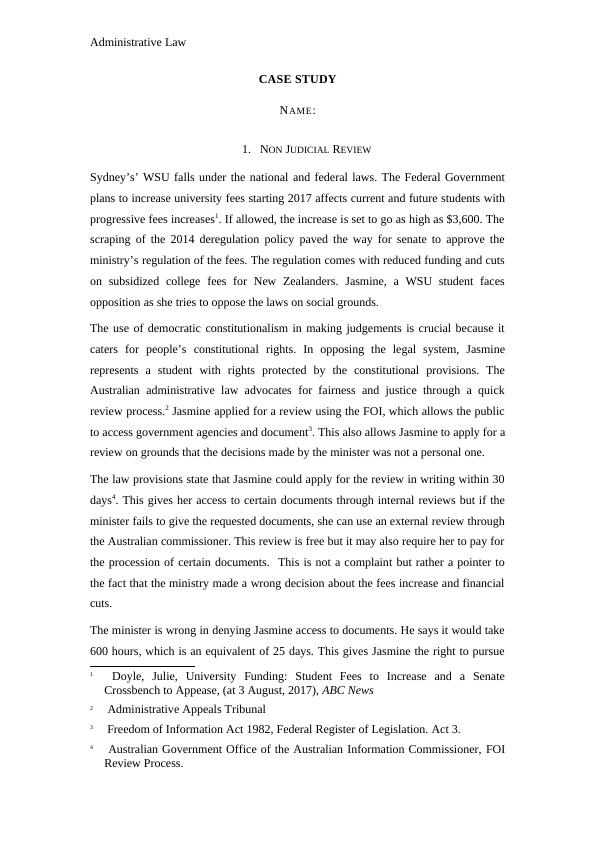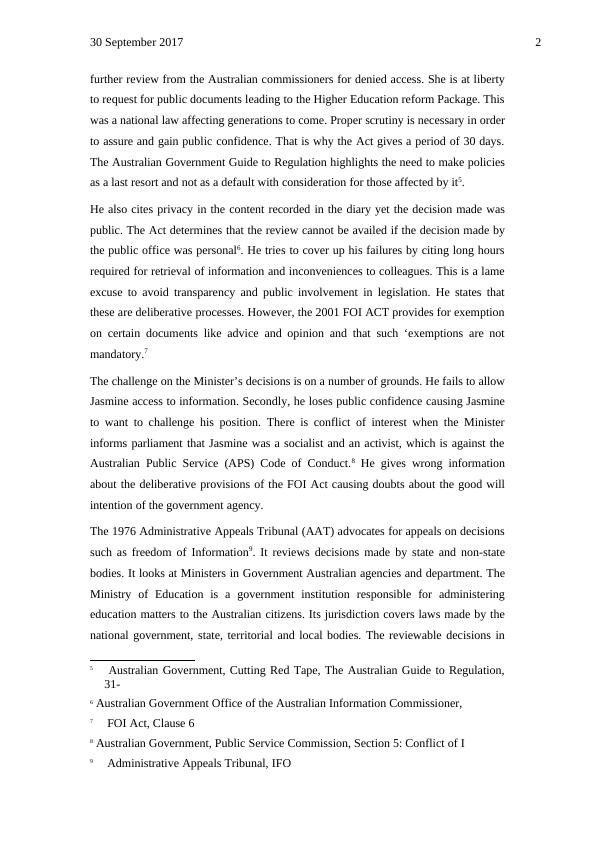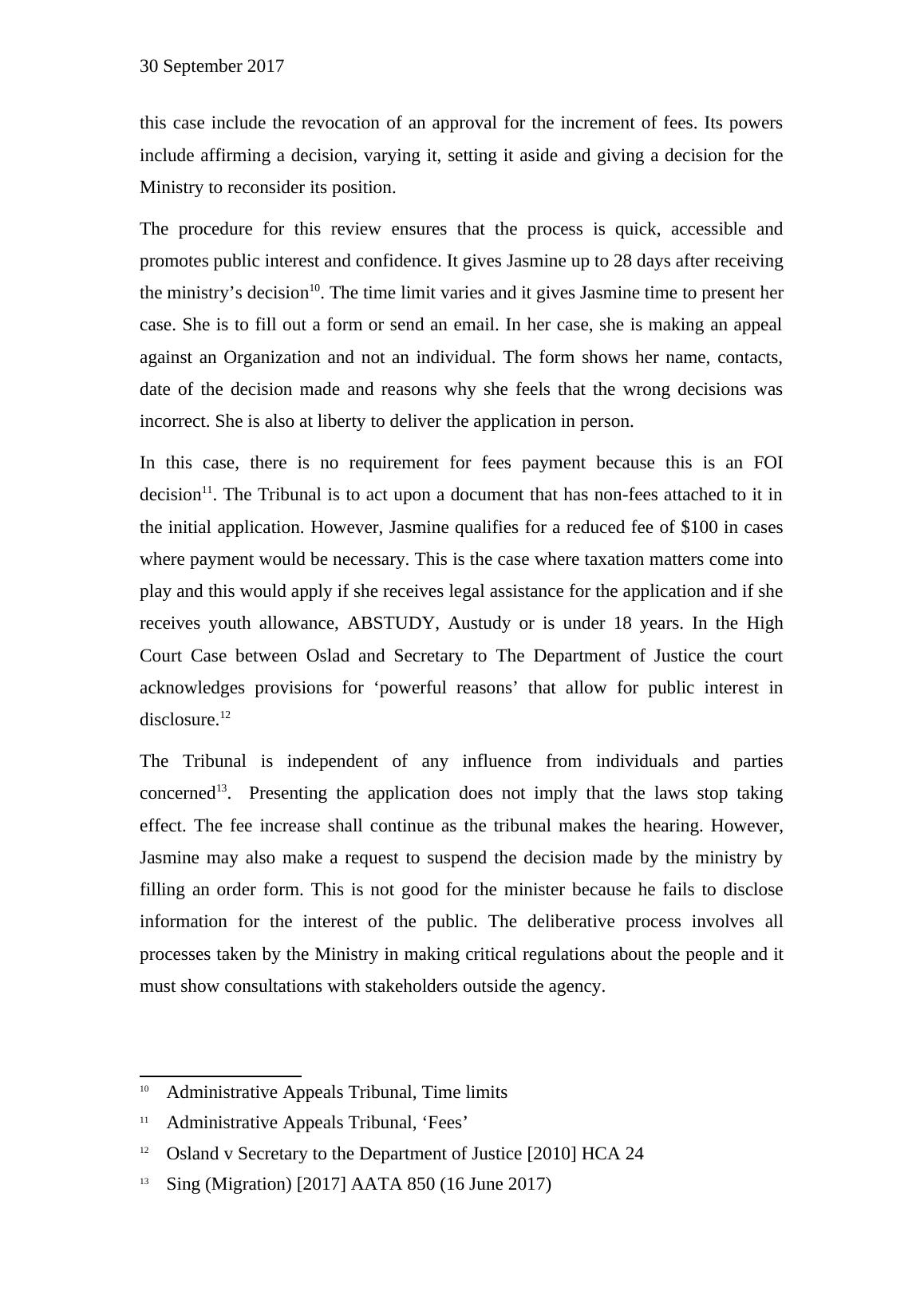Administrative Law Case Study
9 Pages2678 Words54 Views
Added on 2020-03-16
Administrative Law Case Study
Added on 2020-03-16
ShareRelated Documents
Administrative LawCASE STUDYNAME:1.NON JUDICIAL REVIEWSydney’s’ WSU falls under the national and federal laws. The Federal Governmentplans to increase university fees starting 2017 affects current and future students withprogressive fees increases1. If allowed, the increase is set to go as high as $3,600. Thescraping of the 2014 deregulation policy paved the way for senate to approve theministry’s regulation of the fees. The regulation comes with reduced funding and cutson subsidized college fees for New Zealanders. Jasmine, a WSU student facesopposition as she tries to oppose the laws on social grounds.The use of democratic constitutionalism in making judgements is crucial because itcaters for people’s constitutional rights. In opposing the legal system, Jasminerepresents a student with rights protected by the constitutional provisions. TheAustralian administrative law advocates for fairness and justice through a quickreview process.2 Jasmine applied for a review using the FOI, which allows the publicto access government agencies and document3. This also allows Jasmine to apply for areview on grounds that the decisions made by the minister was not a personal one.The law provisions state that Jasmine could apply for the review in writing within 30days4. This gives her access to certain documents through internal reviews but if theminister fails to give the requested documents, she can use an external review throughthe Australian commissioner. This review is free but it may also require her to pay forthe procession of certain documents. This is not a complaint but rather a pointer tothe fact that the ministry made a wrong decision about the fees increase and financialcuts. The minister is wrong in denying Jasmine access to documents. He says it would take600 hours, which is an equivalent of 25 days. This gives Jasmine the right to pursue1Doyle, Julie, University Funding: Student Fees to Increase and a SenateCrossbench to Appease, (at 3 August, 2017), ABC News2 Administrative Appeals Tribunal3 Freedom of Information Act 1982, Federal Register of Legislation. Act 3.4 Australian Government Office of the Australian Information Commissioner, FOIReview Process.

30 September 20172further review from the Australian commissioners for denied access. She is at libertyto request for public documents leading to the Higher Education reform Package. Thiswas a national law affecting generations to come. Proper scrutiny is necessary in orderto assure and gain public confidence. That is why the Act gives a period of 30 days.The Australian Government Guide to Regulation highlights the need to make policiesas a last resort and not as a default with consideration for those affected by it5. He also cites privacy in the content recorded in the diary yet the decision made waspublic. The Act determines that the review cannot be availed if the decision made bythe public office was personal6. He tries to cover up his failures by citing long hoursrequired for retrieval of information and inconveniences to colleagues. This is a lameexcuse to avoid transparency and public involvement in legislation. He states thatthese are deliberative processes. However, the 2001 FOI ACT provides for exemptionon certain documents like advice and opinion and that such ‘exemptions are notmandatory.7The challenge on the Minister’s decisions is on a number of grounds. He fails to allowJasmine access to information. Secondly, he loses public confidence causing Jasmineto want to challenge his position. There is conflict of interest when the Ministerinforms parliament that Jasmine was a socialist and an activist, which is against theAustralian Public Service (APS) Code of Conduct.8 He gives wrong informationabout the deliberative provisions of the FOI Act causing doubts about the good willintention of the government agency. The 1976 Administrative Appeals Tribunal (AAT) advocates for appeals on decisionssuch as freedom of Information9. It reviews decisions made by state and non-statebodies. It looks at Ministers in Government Australian agencies and department. TheMinistry of Education is a government institution responsible for administeringeducation matters to the Australian citizens. Its jurisdiction covers laws made by thenational government, state, territorial and local bodies. The reviewable decisions in5Australian Government, Cutting Red Tape, The Australian Guide to Regulation,31-6 Australian Government Office of the Australian Information Commissioner, 7FOI Act, Clause 68 Australian Government, Public Service Commission, Section 5: Conflict of I9 Administrative Appeals Tribunal, IFO

30 September 20173this case include the revocation of an approval for the increment of fees. Its powersinclude affirming a decision, varying it, setting it aside and giving a decision for theMinistry to reconsider its position. The procedure for this review ensures that the process is quick, accessible andpromotes public interest and confidence. It gives Jasmine up to 28 days after receivingthe ministry’s decision10. The time limit varies and it gives Jasmine time to present hercase. She is to fill out a form or send an email. In her case, she is making an appealagainst an Organization and not an individual. The form shows her name, contacts,date of the decision made and reasons why she feels that the wrong decisions wasincorrect. She is also at liberty to deliver the application in person. In this case, there is no requirement for fees payment because this is an FOIdecision11. The Tribunal is to act upon a document that has non-fees attached to it inthe initial application. However, Jasmine qualifies for a reduced fee of $100 in caseswhere payment would be necessary. This is the case where taxation matters come intoplay and this would apply if she receives legal assistance for the application and if shereceives youth allowance, ABSTUDY, Austudy or is under 18 years. In the HighCourt Case between Oslad and Secretary to The Department of Justice the courtacknowledges provisions for ‘powerful reasons’ that allow for public interest indisclosure.12The Tribunal is independent of any influence from individuals and partiesconcerned13. Presenting the application does not imply that the laws stop takingeffect. The fee increase shall continue as the tribunal makes the hearing. However,Jasmine may also make a request to suspend the decision made by the ministry byfilling an order form. This is not good for the minister because he fails to discloseinformation for the interest of the public. The deliberative process involves allprocesses taken by the Ministry in making critical regulations about the people and itmust show consultations with stakeholders outside the agency. 10 Administrative Appeals Tribunal, Time limits11 Administrative Appeals Tribunal, ‘Fees’12Osland v Secretary to the Department of Justice [2010] HCA 2413 Sing (Migration) [2017] AATA 850 (16 June 2017)

End of preview
Want to access all the pages? Upload your documents or become a member.
Related Documents
Administration Law Assignmentlg...
|14
|3795
|34
Administrative Law Spring Assignmentlg...
|12
|3680
|37
Administration Law Report - Information Act 1982lg...
|6
|1344
|138
Freedom of Information Act 1982 - Assignmentlg...
|13
|3333
|39
Request for Subclass 500 (Student) Visa for Jordanlg...
|6
|1293
|350
